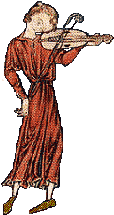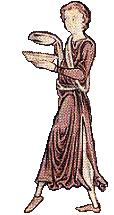

|
|
 TABLE OF CONTENTS RECIPES & COOKERY: Recipes from A Newe Boke of Olde Cokery Incredible Foods, Solteties, & Entremets Glossary of Medieval Cooking Terms ARTICLES ON COOKERY: Regimen Sanitatis Salernitanum An Elizabethan Dinner Conversation Coqz Heaumez - A Helmeted Cock FEASTS & DINNERS: IMAGES: RESOURCES: Gode Cookery Awards and Site Reviews RECIPES MAY BE FOUND IN: Recipes from A Newe Boke of Olde Cokery Incredible Foods, Solteties, & Entremets Coqz Heaumez - A Helmeted Cock PLEASE VISIT: The Gode
Cookery Bookshop |
James Matterer's collection
of period receipts redacted for
use in
the modern kitchen, including soups, sauces, pies, roasts, vegetables,
fruits, and sweets. Each dish contains the original period recipe,
followed
by James' translation and his modern redaction, along with notes,
bibliography,
and a link to metric, celsius, & gas mark equivalencies for
measurements
& temperatures.
http://www.godecookery.com/goderec/goderec.htm
Recipes from several
medieval English manuscripts and
collections,
each in its original language and accompanied with a literal
translation,
and followed by a modern interpretation of the recipe and its cooking
procedures.
These recipes do not contain specific measurements and quantities, but
are sufficiently explained that any competent cook will be able to
prepare
them.
http://www.godecookery.com/mtrans/mtrans.htm
The Culinary Recipes from MS Pepys 1047 An original translation by
James Matterer of the culinary
recipes
found in Manuscript Pepys 1047 'Miscell. of Receipt's/M.S.S. Temp.
R.
Ed. 4', a late 15th century collection of recipes and remedies
found
in the library of Samuel Pepys.
http://www.godecookery.com/pepys/pepys.htm
Recipes & additional
text from the 16th century
culinary manuscript, A
Propre new booke of Cokery (1545). Included with the 49 original
receipts
are our translations & contemporary redactions.
http://www.godecookery.com/trscript/trscript.html
A Newe
Boke of Cokery is a
collection
of period recipes with modern adaptations by Rudd Rayfield of
Minneapolis,
Minnesota. Rudd is a medieval enthusiast with an academic background in
Middle English literature and medieval history. He has been cooking
medieval
cuisine since 1980 and has been doing his own redactions from primary
sources
since 1988. A Boke of Gode Cookery is
very
pleased to feature his recipes & menus here. Each of Rudd's recipes
contain the original documented medieval version followed by his modern
adaptation, along with notes, bibliography, and a link to metric,
celsius,
& gas mark equivalencies for measurements & temperatures.
http://www.godecookery.com/nboke/neweboke.htm
Fantastic foods and fabulous
presentations for medieval
feasts, all
from period cooking sources. Not all of the recipes are suitable for
eating;
however, all are enjoyable to read and wonderfully amazing.
http://www.godecookery.com/incrd/incrd.htm
A companion site to
Incredible Foods, Solteties, &
Entremets.
Authentic recipes from period sources, detailing dishes that emulate
other
foods or objects.
http://www.godecookery.com/illusion/illusion.html
Seven recreated recipes
based on ancient sources and
traditional
Greek cooking, along with a brief overview of Byzantine foods, written
by Rebecca and David Wendelken. Originally from a now out-of-print
publication
called Early Period, issue #5.
http://www.godecookery.com/byznrec/byznrec.htm
A
contributory site for historical
cooks to
share their recipes and research, with over 100 recreated dishes along
with articles on historical cooking subjects. In addition to
the
recipe and notes, each page also contains a link to metric, celsius,
&
gas mark equivalencies for measurements & temperatures.
To be a contributor, contact Gode Cookery. http://www.godecookery.com/friends/friends.htm
A collection of late-16th
& 17th century English
recipes &
receipts presented in their original language, all from documented
primary
sources.
http://www.godecookery.com/engrec/engrec.html
For cooks not quite ready
for authentic medieval cookery,
or for
guests who are hesitant in trying real period food, these recipes may
be
just the thing. Although not from true medieval sources and not
documentable,
they are very period in style, flavor, and ingredients, and are perfect
for dinners with a medieval theme where authenticity is not a concern.
In addition to the recipe and notes, each page also contains a link to
metric, celsius, & gas mark equivalencies for measurements &
temperatures.
http://www.godecookery.com/begrec/begrec.htm
All of the recipes in the
Gode Cookery website, in a
complete listing
arranged alphabetically by category. Over 350 recipes in 10 categories.
http://www.godecookery.com/allrec/allrec.htm
A glossary of medieval
cooking terms as found in period
manuscripts,
with Middle English words and phrases followed by modern English
translations.
http://www.godecookery.com/glossary/glossary.htm
Geoffrey Chaucer, the great
English poet and author of The
Canterbury
Tales, used food as a literary device to enrich the personalities
of
his characters. A Chaucerian
Cookery
examines the references to food and medieval dishes in
all
of Chaucer's writings, studies the dietary habits of his characters,
and
gives a complete list of all foods Chaucer refers to. Included is A
Chaucerian Feast, which presents an authentic medieval
feast
based on the writings of Chaucer and 14 corresponding 14th c. recipes,
as well as detailing the presentation and courses of a standard
medieval
feast.
http://www.godecookery.com/chaucer/ccookery.htm
A modern English translation
of Regimen Sanitatis
Salernitanum,
the famous 12th - 13th century Salernitan Regimen of Health, a highly
respected
and scholarly text in the Middle Ages and an invaluable source today
for
information on medieval food, diet, & medicine.
http://www.godecookery.com/regimen/regimen.htm
An explanation of what foods
were available in the Middle
Ages &
Renaissance and the cooking methods employed at that time. This site is
designed specifically to help those who wish to re-create medieval
recipes
& meals as authentically as possible, and contains lists of what
foods
were available, how they were cooked, and which foods should never be
used
by today's medieval cooks.
http://www.godecookery.com/how2cook/how2cook.htm
A brief explanation of how
period cooks categorized food by
using
the Four Humours philosophy of the Middle Ages, and how to organize the
menu of a modern feast according to medieval standards and practices.
Ideal
for students with school projects, beginners in medieval cookery, or
those
who wish to prepare a dinner from the Middle Ages for their friends and
family.
http://www.godecookery.com/feastpre/feastpre.htm
An excerpt from a 16th
century French-English conversation
manual,
depicting an English family at dinner.
http://www.godecookery.com/eldin/eldin.html
The history of and detailed
instructions for preparing that
most
delectable of medieval beasts, the noble Cockentrice, part capon and
part
suckling pig. With photographs of a real Cockentrice.
http://www.godecookery.com/cocken/cocken.htm
A 14th c. French recipe from
Le Viandier de Taillevent,
in
which a pig becomes a horse and a chicken takes to the saddle! With
photographs
of a prepared Helmeted Cock.
http://www.godecookery.com/helmeted/helmeted.htm
Gingerbread
in the Middle Ages was
nothing
at all like its modern descendant. Not only was it not a bread or a
cake,
some medieval versions didn't even contain ginger!
http://www.godecookery.com/ginger/ginger.htm
In the
Middle Ages, deer were a
primary source
of food, resources, and inspiration, and the medieval table was often
laden
with a variety of venison. This article examines the popularity of deer
as an object of the hunt and as an important source of protein in the
medieval
diet.
http://www.godecookery.com/venison/venison.htm
A collection of humorous
tales of cooks, kitchens, food,
dining &
eating, from both period & secondary sources.
http://www.godecookery.com/mirth/mirth.html
Redactions
of two English apple
pie recipes and a
discussion of how they changed over time. http://www.godecookery.com/twotarts/twotarts.html
Information on Gode
Cookery's latest feasts & dinners.
http://www.godecookery.com/latest/latest.htm
Menus from presented SCA
feasts with links to corresponding
recipes.
http://www.godecookery.com/scafeast/scafeast.htm
The menus of the 2001, 2002,
2003, 2004, & 2005 Alabama
Renaissance
Faire
Feasts,
catered by Gode Cookery, with complete recipes and notes, along with
photographs.
http://www.godecookery.com/alabama/al2001.html
A Medieval & Renaissance
Food & Feast Image
Collection, with
period illustrations of food & cookery arranged in various
galleries,
all suitable for downloading.
http://www.godecookery.com/afeast/afeast.htm
Illuminations and text from
medieval health handbooks.
http://www.godecookery.com/tacuin/tacuin.htm
Photographs
of Gode Cookery feasts, dinners, events - even the cooks themselves! http://www.godecookery.com/pics/galleries.html
In association with Amazon.com,
The Gode Cookery Bookshop presents for sale some of the finest medieval
& Renaissance cookery & food books that are in print today.
http://www.godecookery.com/godeboke/bookshop/bookshop.htm
Our recommendations and
awards, along with various site
reviews of
A Boke of Gode Cookery.
http://www.godecookery.com/godeboke/wallfame/wallfame.htm
The Discussion Group is open
to anyone with a desire and
willingness
to communicate and share information with others who are interested in
medieval & Renaissance cookery. Members may either receive
individual
letters or a digest. The list is moderated and SPAM, rudeness,
offensive
language, and intolerance are not acceptable.
For further information on the Discussion Group, please go
to The Gode Cookery Discussion Group http://www.godecookery.com/maillist/maillist.htm
Search Gode Cookery courtesy of Master.com
|



 Gode
Cookery Table
of Contents
Gode
Cookery Table
of Contents
 Gode Cookery
Gode Cookery